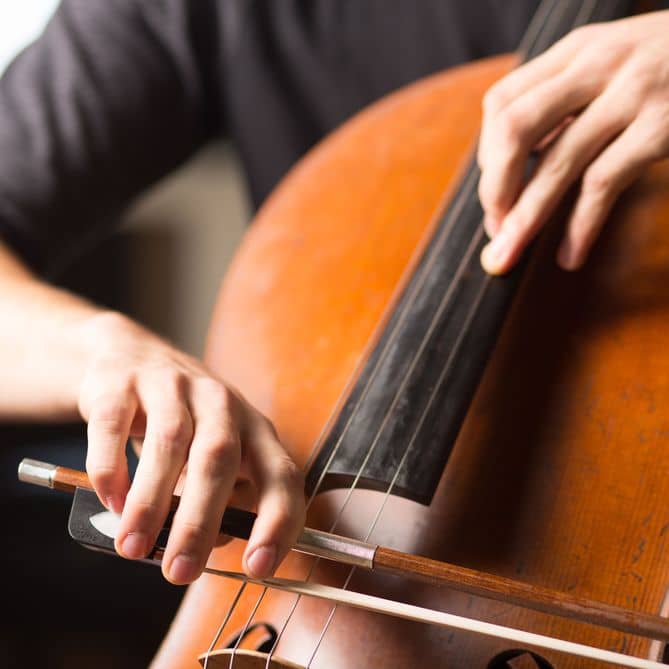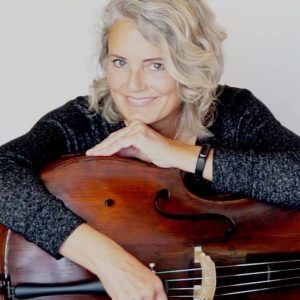
Benefits of Learning the Cello Later in Life
Carolyn Hagler
Is the cello hard to learn as an adult? Perhaps… but there’s a huge benefit of learning to play the cello later in life.
Let me start with a little disclaimer: I did not begin the cello as an adult. I was around nine when I first put my arms around one (I’m in my late 50’s now, so it’s been a while). But I want to tell you about a life-changing event which happened to me and forever altered the way I think about learning something new as an adult.
Intellectually, we understand that our brains are very capable of learning new activities as we age. Our motivation is the primary attribute which either allows us to take on this big world or prevents us from ever reaching for it. We are older and a little more weary than we were in our youth, yet our brains still have the capacity to do what we need them to do. And our brains NEED to take on new ventures as we age. I know this to be true because in October of 2017, I had a stroke, and a little piece of my brain was forever damaged. I’ve learned a lot of new things since that day.
I won’t go into all the details of the event, but I will tell you that I temporarily lost the use of my left hand. No dialogue was going from my brain to my hand. What a strange feeling it was to ask your hand to do something but it can’t hear you. The left hand controls our vibrato, and in turn, it controls the bulk of the emotion we express through the cello. This was the hand which would determine if I would ever play the cello again.
At the hospital I found myself in a room full of physicians waiting for me to agree to the next step. Apparently, time was running out and I needed to take a magic elixir which could help bring viability back into my hand. It was a scary decision to make because of the potential complications involved, but a life without the cello was incomprehensible. I surrendered to the reality of the consequences of a stroke and decided the medicine was worth the risk.
It takes a full hour to administer this clot-busting medicine (known as tPA) and after about 25 minutes I was able to move my pinkie and my ring finger! By the time the medicine had travelled through the bloodstream, my middle finger had regained mobility as well. Later that evening I reclaimed much of the function of my index finger and a tiny bit of movement from my thumb. The fingers moved in fits and starts… but they moved. I knew at that point I would be ok. I was lucky, to say the least.
The occupational therapist planned to give me a series of exercises to help me regain the full use of my index finger and thumb. At our first session in the hospital she told me there was nothing she could do for me that would be nearly as beneficial as practicing the cello. She said, “just play, play, play”. That was my new mantra. After I returned home, I practiced for hours every day.
So what does this all have to do with starting the cello later in life? Plenty. I felt like I had gotten a second chance to play the cello. I realized I had taken for granted all the profound music I was able to make and all lives I had touched over the years. The cello allowed me to speak in ways which words couldn’t, and after years of having a love/hate relationship with my cello, I woke. Everyone should have the opportunity to experience the joy of playing the cello.
A couple weeks later I saw a neurologist. After comparing brain scans, he said it was rather remarkable how much my brain had healed since the stroke. My brain forged a new path to my thumb and and strength was mostly restored to my hand. He attributed much of my recovery to my persistent cello practice.
The following months proved to be a very introspective time for me. What was I going to do with this newfound luxury of playing the cello? I had always loved teaching and I was passionate about affordable learning. Why not put the two together in a way which would be accessible to people everywhere? This feat would require me to learn a whole lot of new things. The “old” me would have said, no. That’s too hard. The “new” me said, yes. Let me learn. So I learned how to work a video camera. I learned about microphones and digital audio workstations. I learned how to edit midi files and video clips and so much more. And alas, after hundreds of hours, I built an affordable tool for the adult beginning cellist. None of this would have happened until I grasped the importance of keeping those neurons in my brain firing away.
We all know the cello is one of the most expressive instruments in the world, so it’s no wonder many adults want to learn how to play it. Though it’s true there will be frustrations along the way, it’s also true that learning the cello will feed the brain and the soul. Time will continue to move forward, and like anything else in life, each week of learning will bring you another step closer to accomplishment. Playing the cello was the panacea for my recovery. Imagine what could it do for you.
Subjects: Adult Cello Learning
